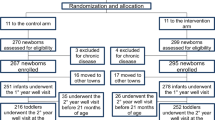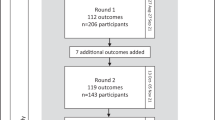Abstract
Background
Standardisation of outcomes measured and reported in trials of infant-feeding interventions to prevent childhood obesity is essential to evaluate and synthesise intervention effects. The aim of this study is to develop an infant-feeding core outcome set for use in randomised trials of infant-feeding interventions, with children ≤1 year old, to prevent childhood obesity.
Methods
Core outcome set development followed four stages: (1) systematic review of outcomes reported in the extant literature; (2) meeting with national and international stakeholders to discuss and clarify identified outcomes; (3) e-Delphi study with national and international stakeholders to prioritise outcomes; (4) meeting with national and international stakeholders to reach consensus on outcomes. Stakeholders in stages 2–4 were paediatricians, general practitioners, nurses, midwives, non-clinician researchers, parents, dieticians, nutritionists, and childcare providers.
Results
Twenty-six outcomes were identified for inclusion in the core outcome set. These were grouped in nine outcome domains: ‘breastfeeding and formula feeding’, ‘introduction of solids’, ‘parent feeding practices and styles’, ‘parent knowledge and beliefs’, ‘practical feeding’, ‘food environment’, ‘dietary intake’, ‘perceptions of infant behaviour and preferences’, and ‘child weight’.
Conclusions
The core outcome set identified in this study is the minimum that should be measured and reported in trials of infant-feeding interventions to prevent childhood obesity. This standardisation of outcomes will enable more comprehensive examination and synthesis of the effects of infant-feeding interventions to prevent childhood obesity.
This is a preview of subscription content, access via your institution
Access options
Subscribe to this journal
Receive 12 print issues and online access
$259.00 per year
only $21.58 per issue
Buy this article
- Purchase on Springer Link
- Instant access to full article PDF
Prices may be subject to local taxes which are calculated during checkout

Similar content being viewed by others
References
Ng M, Fleming T, Robinson M. Global, regional, and national prevalence of overweight and obesity in children and adults during 1980-2013: a systematic analysis for the Global Burden of Disease Study 2013. Lancet. 2014;384:746.
Kim J, Lee I, Lim S. Overweight or obesity in children aged 0 to 6 and the risk of adult metabolic syndrome: a systematic review and meta-analysis. J Clin Nurs. 2017;26:3869–80.
Biro FM, Wien M. Childhood obesity and adult morbidities. Am J Clin Nutr. 2010;91:1499S–1505S.
Bacha F, Gidding SS. Cardiac abnormalities in youth with obesity and type 2 diabetes. Curr Diabetes Rep. 2016;16:62.
Mohanan S, Tapp H, McWilliams A, Dulin M. Obesity and asthma: pathophysiology and implications for diagnosis and management in primary care. Exp Biol Med. 2014;239:1531–40.
Maffeis C, Tato L. Long-term effects of childhood obesity on morbidity and mortality. Horm Res. 2001;55(Suppl 1):42–45.
Blake-Lamb TL, Locks LM, Perkins ME, Woo Baidal JA, Cheng ER, Taveras EM. Interventions for childhood obesity in the first 1,000 days; a systematic review. Am J Prev Med. 2016;50:780–9.
Taylor BJ, Gray AR, Galland BC, Heath AM, Lawrence J, Sayers R, et al. Targeting sleep, food, and activity in infants for obesity prevention: an RCT. Pediatrics. 2017;139:e20162037.
Brown A, Lee M. Maternal child-feeding style during the weaning period: association with infant weight and maternal eating style. Eat Behav. 2011;12:108–11.
Fewtrell M, Bronsky J, Campoy C, Domellöf M, Embelton N, Fidler Mis N, et al. Complementary feeding: a position paper by the European Society for Paediatric Gastroenterology, Hepatology, and Nutrition (ESPGHAN) committee on nutrition. J Pediatr Gastroenterol Nutr. 2017;64:119–32.
Papoutsou S, Savva SC, Hunsberger M, Jilani H, Miochels N, Ahrens W, et al. Timing of solid food introduction and association with later childhood overweight and obesity: the IDEFICS study. Matern Child Nutr. 2018;14. https://doi.org/10.1111/mcn.12471.
Pearce J, Langley-Evans SC. The types of food introduced during complementary feeding and risk of childhood obesity: a systematic review. Int J Obes. 2013;37:477–85.
Hurley KM, Cross MB, Hughes SO. A systematic review of responsive feeding and child obesity in high-income countries. J Nutr. 2011;141:495–501.
Matvienko-Sikar K, Toomey E, Delaney L, Harrington J, Byrne M, Kearnery P, et al. Effects of healthcare professional delivered early feeding interventions on feeding practices and dietary intake: a systematic review. Appetite. 2017;123:56–71.
Redsell SAE B, Swift JA, Siriwardena AN, Weng S, Nathan D, Glazebrook C. Systematic review of randomised controlled trials of interventions that aim to reduce the risk, either directly or indirectly, of overweight and obesity in infancy and early childhood. Matern Child Nutr. 2016;12:24–38.
Williamson PR, Altman DG, Bagley H, Barnes KL, Blazeby JM, Brookes ST, et al. The COMET handbook: version 1.0. Trials. 2017;18:280.
Clarke M. Standardising outcomes for clinical trials and systematic reviews. Trials. 2007;8:39.
Potter S, Holcombe C, Ward JA, Blazeby JM, Group BS. Development of a core outcome set for research and audit studies in reconstructive breast surgery. Br J Surg. 2015;102:1360–71.
Webbe J, Brunton G, Ali S, Duffy JM, Modi N, Gale C. Developing, implementing and disseminating a core outcome set for neonatal medicine. BMJ Paediatr Open. 2017;1:e000048.
Gardner W, Kelleher KJ. Core quality and outcome measures for pediatric health. JAMA Pediatrics. 2017;171:827–8.
Webbe J, Modi N, Gale C. Core quality and outcome measures for pediatric health RESPONSE. JAMA Pediatrics. 2018;172:299–300.
Whitford H, Hoddinott P, Amir LH, Chamberlain C, East CE, Jones L, et al. Routinely collected infant feeding data: time for global action. Matern Child Nutr. 2018;14:e12616.
Matvienko-Sikar K, Byrne M, Kelly C, Toomey E, Hennessy M, Devane D, et al. Development of an infant feeding core outcome set for childhood obesity interventions: study protocol. Trials. 2017;18:463.
Kirkham JJ, Gorst S, Altman DG, Blazeby J, Clarke M, Devane D, et al. Core outcome Set-STAndards for reporting: the COS-STAR statement. PLoS Med. 2016;13:e1002148.
Matvienko-Sikar K, Griffin C, McGrath N, Toomey E, Byrne M, Kelly C, et al. Developing a core outcome set for childhood obesity prevention: a systematic review. Matern Child Nutr. 2018;15:e12680.
Matvienko-Sikar K, Kelly C, Sinnott C, McSharry J, Houghton C, Heary C, et al. Parental experiences and perceptions of infant complementary feeding: a qualitative evidence synthesis. Obes Rev. 2018;19:501–17.
Toomey E, Byrne M, Houghton C, Kelly C, Matvienko-Sikar K, McSHarry J, et al. Health-care professional and parental views and experiences of implementing infant feeding interventions: a qualitative evidence synthesis. Lancet. 2018;392:S87.
COMET. Plain Language Summary. http://www.comet-initiative.org/resources/PlainLanguageSummary.
Williamson PR, Altman DG, Blazeby JM, Clarke M, Devane D, Gargon E, et al. Developing core outcome sets for clinical trials: issues to consider. Trials. 2012;13:1–8.
COMET. Delphi Manager Software. http://www.comet-initiative.org/delphimanager/.
Pagnini D, King L, Booth S, Wilkenfeld R, Booth M. The weight of opinion on childhood obesity: recognizing complexity and supporting collaborative action. Int J Pediatr Obes. 2009;4:233–41.
Ben-Sefer E, Ben-Natan M, Ehrenfeld M. Childhood obesity: current literature, policy and implications for practice. Int Nurs Rev. 2009;56:166–73.
Modrek S, Basu S, Harding M, White JS, Bartick MC, Rodriguez E, et al. Does breastfeeding duration decrease child obesity? An instrumental variables analysis. Pediatr Obes. 2017;12:304–11.
Koletzko B, von Kries R, Closa R, Escribano J, Scaglioni S, Giovannini M, et al. Lower protein in infant formula is associated with lower weight up to age 2 y: a randomized clinical trial. Am J Clin Nutr. 2009;89:1836–45.
Weber M, Grote V, Closa-Monasterolo R, Escribano J, Langhendries JP, Dain E, et al. Lower protein content in infant formula reduces BMI and obesity risk at school age: follow-up of a randomized trial. Am J Clin Nutr. 2014;99:1041–51.
Weng SF, Redsell SA, Swift JA, Yang M, Glazebrook CP. Systematic review and meta-analyses of risk factors for childhood overweight identifiable during infancy. Arch Dis Child. 2012;97:1019–26.
O’Malley C, Mazarello Paes V, Hesketh K, Moore HJ, Ong K, Van Sluijs, et al. Systematic review on the determinants of fruit and vegetable consumption in young children (aged 0-6). Obes Facts. 2015;8:70
DiSantis KI, Hodges EA, Johnson SL, Fisher JO. The role of responsive feeding in overweight during infancy and toddlerhood: a systematic review. Int J Obes. 2011;35:480–92.
Schrempft S, van Jaarsveld CHM, Fisher A, Wardle J. The obesogenic quality of the home environment: associations with diet, physical activity, TV viewing, and BMI in preschool children. PLoS ONE. 2015;10:e0134490.
Birch LL, Anzman-Frasca S. Promoting children’s healthy eating in obesogenic environments: lessons learned from the rat. Physiol Behav. 2011;104:641–5.
Sinha IP, Smyth RL, Williamson PR. Using the delphi technique to determine which outcomes to measure in clinical trials: recommendations for the future based on a systematic review of existing studies. PLoS Med. 2011;8:e1000393.
Khandpur N, Charles J, Davison KK. Fathers’ perspectives on coparenting in the context of child feeding. Child Obes. 2016;12:455–62.
Earle S, Hadley R. Men’s views and experiences of infant feeding: a qualitative systematic review. Matern Child Nutr. 2018;14:e12586.
Davison KK, Kitos N, Aftosmes-Tobio A, Ash T, Agarnov A, Sepulveda M, et al. The forgotten parent: fathers’ representation in family interventions to prevent childhood obesity. Prev Med. 2018;111:170–6.
Harman NL, Bruce IA, Kirkham JJ, Tierney S, Callery P, O’Brien K, et al. The importance of integration of stakeholder views in core outcome set development: otitis media with effusion in children with cleft palate. PLoS ONE. 2015;10:e0129514.
Dos Santos F, Drymiotou S, Martin AA, Mol BW, Gale C, Devane D, et al. Development of a core outcome set for trials on induction of labour: an international multistakeholder Delphi study. BJOG. 2018;125:1673–80.
McGrattan M, Barry HE, Ryan C, Cooper JA, Passmore AP, Robinson AL, et al. The development of a core outcome set for medicines management interventions for people with dementia in primary care. Age Ageing. 2018;48:260–6.
Bergmeier H, Paxton SJ, Milgrom J, Anderson SE, Baur L, Hill B, et al. Early mother-child dyadic pathways to childhood obesity risk: a conceptual model. Appetite. 2019;144:104459.
Prinsen CA, Mokkink LB, Bouter LM, Alonso J, Patrick DL, de Ver HCW, et al. COSMIN guideline for systematic reviews of outcome measurement instruments. Qual Life Res. 2016;25:21.
Acknowledgements
The authors would like to thank all participants of e-Delphi, and participants of the stakeholder and consensus meetings: AnneMarie Bennett, Brendan O Shea, Carol Ni Chaoimh, Eilish Whelan, Elizabeth O Sullivan, Ide NicDhonncha, Joanne O Halloran, Karen Roche, Kathy McSharry, Marian O Reilly, Mary Flynn, Oonagh Meade, Patricia Leahy-Warren, Rachel Laws, Sarah Redsell, Shalini Ojha, and Tony Heffernan. The authors would also like to thank the COMET Initiative for advice and support in developing the COS.
Funding
This research was supported by a Health Research Board Interdisciplinary Capacity Enhancement Award (ICE-2015-1026) and an Irish Research Council New Foundations Award (2015). CG was in receipt of a Health Research Board-Trials Methodology Research Network (HRB-TMRN) summer studentship to support this research.
Author information
Authors and Affiliations
Corresponding author
Ethics declarations
Conflict of interest
The authors declare that they have no conflict of interest.
Additional information
Publisher’s note Springer Nature remains neutral with regard to jurisdictional claims in published maps and institutional affiliations.
Rights and permissions
About this article
Cite this article
Matvienko-Sikar, K., Griffin, C., Kelly, C. et al. A core outcome set for trials of infant-feeding interventions to prevent childhood obesity. Int J Obes 44, 2035–2043 (2020). https://doi.org/10.1038/s41366-020-0538-2
Received:
Revised:
Accepted:
Published:
Issue Date:
DOI: https://doi.org/10.1038/s41366-020-0538-2
This article is cited by
-
Core outcome set for early intervention trials to prevent obesity in childhood (COS-EPOCH): Agreement on “what” to measure
International Journal of Obesity (2022)
-
Synthesizing Core Outcome Sets for outcomes research in cohort studies: a systematic review
Pediatric Research (2022)



